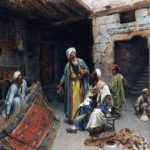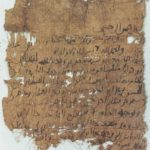
The second sūra that came in Makka was Sūrat al-Qalam which runs: Nūn. By the pen and what they write, by the grace of your Lord you are not mad. And most surely you shall have a reward never to be cut off. And most surely you are of sublime morality. So you shall see, and they too shall see, which of you is afflicted with madness. Surely your Lord best knows him who errs from His way, and He best knows the followers of the right course. So do not yield to the rejecters. They wish that you should be pliant so they too would be pliant. And yield not to any mean oath-monger, detracter, spreader abroad of slanders, forbidder of good, one outstepping the limits, sinful, ignoble and, besides all that, base-born; because he possesses wealth and sons. When Our communications are recited to him, he says: ‘Mere stories of those of yore!’. We will brand him on the nose.[i]
NOW IMAGINE MUḤAMMAD, after Jibrīl brought him the first sūra and he stood afraid and trembling, fancied that the devil had touched him with madness, and then went off to Khadīja for reassurance, only to return later to the cave of Ḥirā’, whereupon Jibrīl came again to say to him: Nūn. By the pen and what they write. What actually is the meaning of Nūn? Then again he says to him: By the pen and what they write. What is Muḥammad’s connection with the Pen for Jibrīl to repeat it to him in two consecutive sūras? And who are the ‘they’ who ‘write’?
These verses must have acted as a talisman for the new Messenger chosen by the Lord of Heaven to spread His word and make people aware of it. If God was so fond of the pen, why did He choose an illiterate messenger who did not know about pens? The sequence of events is clearly confusing. Muḥammad was the one who thought he was mad when he first saw Jibrīl and wanted to kill himself and said, “Do not speak to the Quraysh about me”. Whereupon God said to him: by the grace of your Lord you are not mad.
It seems that God has judged anyone who does not follow Muḥammad to be a criminal
Up to this point things are reasonable enough, but the Qur’ān then says to him: So you shall see, and they too shall see, which of you is afflicted with madness. Until that moment, Muḥammad had not been convinced that he was a Messenger, nor did he tell the Quraysh of his new call, so therefore no one was saying that he was mad. So why does the Qur’ān say to him: So you shall see, and they too shall see, which of you is afflicted with madness? The following verse is more obscure: Surely your Lord best knows him who errs from His way, and He best knows the followers of the right course. Muḥammad, as we said, had not yet communicated his Message to anyone, so why anticipate events and talk about those who follow the right course and those who err? Would it not have been for God to introduce Himself to His Messenger and tell him what God is, what His attributes are, and what Muḥammad is required to communicate to people?

Suggested Reading
Sūrat al-Qalam continues, and God says to Muḥammad: So do not yield to the rejecters. They wish that you should be pliant so they too would be pliant. Why talk about rejecters when he had not spoken to them for him to know whether the Quraysh would believe him or not? Here again the Qur’ān employs obscure speech: the word yudhinūn ‘pliant’ is a strange word in the context of the verse and was not understood by contemporaries. The commentators therefore came up with twelve interpretations for it, ranging from ‘lying’ to ‘being soft’ on enemies to acknowledging some of the gods of the Quraysh. Is this a good start to a Message that is supposed to be for all humankind, while the speakers themselves of the Arabic language could not understand it, and while the new Prophet himself did not understand what was meant by Nūn? In my opinion, Muḥammad inserted this letter nūn at the beginning of the sūra in order to delude his listeners into thinking that the Qur’ān was not written by him but was from God, the ‘proof’ of this being that Muhammad himself did not know the meaning of ‘Nūn’.
Then the sūra continues, and God says to him,
And yield not to any mean oath-monger, detracter, spreader abroad of slanders, forbidder of good, one outstepping the limits, sinful, ignoble and, besides all that, base-born; because he possesses wealth and sons. When Our communications are recited to him, he says: ‘Mere stories of those of yore!’. We will brand him on the nose.
Is this the Lord of Heaven talking to Muḥammad, or is Muḥammad himself talking about someone with money who hates him and imagines that he will be hostile to him and ridicule his words? This is a language unworthy of the Lord of Heaven who is capable of crushing such a person in the blink of an eye. Why all this cursing and threats that He will he scalded on the Day of Resurrection or have a mark branded on his nose? Why does the Lord of Heaven not send down a thunderbolt to kill him and finish him off, given that He had decided that this person would not convert and would resist his Messenger, and thus swore that he would mark him on the Day of Resurrection on the nose? And what is the importance of this mark on the nose on the Day of Resurrection when people will be so preoccupied with themselves that a person will even abandon his brother, and his mother and his father[ii] and companions who give him shelter, on a Day when every nursing mother will abandon her nursling.[iii] Will anyone notice then that Abū Jahl or Abū Lahab have been branded on the nose? Was Abū Jahl so important that God speaks of him in the second sūra which He ‘revealed’ to his new Messenger, before introducing Himself to his Messenger and explaining to him the Message he was required to convey?
The sūra goes on and God says:
Surely We will try them as We tried the owners of the garden, when they swore that they would pluck its fruit next morning, and were not willing to set aside a portion. Then a visitation from your Lord came upon it while they slept and in the morning it was as if it had been plucked. And they cried out one unto another in the morning, saying: ‘Go early to your tilth if you would pluck, it’. So they went, while they consulted together secretly, saying: ‘No poor man shall enter it today against you’. And in the morning they went, having the power to prevent. But when they saw it, they said: ‘Most surely we have gone astray. Nay! we are made to suffer privation’. The best of them said: ‘Did I not say to you, why do you not glorify (God)?’ They said: ‘Glory be to our Lord, surely we were wrong-doers’.[iv]
Can we therefore blame the Muslims for dividing up the world into the camp of War and the camp of Islam, if their Lord divided people up into Muslims and criminals?
Muḥammad had not yet known about his Message or had even had it confirmed to him that he was a Messenger, yet here God is telling him about the owners of the garden who swore not to allow a poor person to enter their garden, whereupon God burned it at night while they were sleeping. In the morning, when they realized what had happened, they blamed themselves for having gone astray, and then believed in God. It is the ultimate naïvety in logic and narrative. If this was my garden and God burned it at night because I said I wouldn’t let a poor person enter it, I would have disbelieved in God dozens of times instead of believing in Him. And why did God burn it at night while they were sleeping if the purpose was to convince them of His existence? Why did He not burn it during the day while they were looking on so that they would be convinced by this miracle? It is the same story of the Isrā’ that happened at night while people were sleeping. And it is the same story of the people of Lot when the earth swallowed them up while they were sleeping. All His miracles happen at night so that people do not see them and yet believe in them.
It seems that God has judged anyone who does not follow Muḥammad to be a criminal and did not wait until the Day of Judgment to hold people accountable and judge them for their deeds. For He says in the same sūra:
Surely those who guard (against evil) shall have with their Lord gardens of bliss. What! shall We then treat those who submit as We treat the guilty? What has happened to you? How foolishly you judge! Or have you a scripture wherein you read, that you have surely therein what you choose? Or have you received from Us an agreement confirmed by an oath extending to the Day of Resurrection so that you shall surely have what you ordain?[v]
In the second sūra ‘revealed’ to Muḥammad, his Lord divides people into Muslims and criminals, even before Muḥammad himself knew what Islam was. Whoever does not follow Muḥammad and become a Muslim the Lord of Islam makes a criminal. Can we therefore blame the Muslims for dividing up the world into the camp of War and the camp of Islam, if their Lord divided people up into Muslims and criminals? It seems to me that the writer of the Qur’ān had a psychological complex concerning the idea of a pen and writing. He mentions the pen only twice, and here he is mentioning a Book which they are to have been studying before explaining to Muḥammad the ABCs of his Message.
Then He goes on to say:
Or have they other gods? Then let them bring their other gods if they are truthful on the day when there shall be a severe affliction, and they shall be called upon to prostrate, but they shall not be able. With eyes downcast, abasement shall overtake them; yet they were called upon to prostrate themselves while yet they were safe. So leave Me (to deal with) him who rejects this announcement; We will overtake them by degrees, from whence they know not. Yet I bear with them, for lo! My scheme is firm.[vi]
This is a scary scenario, no doubt about it. A day when God reveals Himself and invites the disbelievers to prostrate themselves. But they are unable – perhaps because their joints had become stiff and could not bend – and we see them humbled and exhausted by this humiliation on the grounds that they had been called to prostrate in this world but refused to do so. Then God says to Muḥammad: Leave Me (to deal with) him who rejects this announcement revealed to you and I will overtake them by degrees, from whence they know not because My scheme is firm.
Are these the type of language and qualities worthy of the Lord of Heaven?
Are these the type of language and qualities worthy of the Lord of Heaven who in some other verses of the Qur’ān says: Call to the way of your Lord with wisdom and goodly exhortation?[vii] Is threatening this sadistic torment and luring people thereto with malice and cunning to be considered wisdom and goodly exhortation? And why all of these threats, when Muḥammad had not yet begun to call people to believe in God?
At the end of the sūra, God says to His Messenger:
And those who disbelieve would almost smite you with their eyes when they hear the Reminder, and they say: ‘Most surely he is mad’. When it is naught but a reminder to the worlds.[viii]
If this is the second sūra that was ‘revealed’ to Muhammad, who had not yet confirmed his prophethood, and only Khadīja had submitted alongside him and he was still preaching to some of his fellows in secret, just when did those who disbelieved in the Reminder and refused to believe in it hear of it, so that the Lord of the Qur’ān should threaten them with all kinds of torment?

Suggested Reading
I had expected the first three or four sūras of the Qur’ān to serve as an introduction to Muḥammad’s acknowledgment of his new Lord, to the divine Oneness, and then to Muḥammad’s recognition of that which his Lord tasked him with communicating to the rest of humanity – how people are to be called to know God and believe in Him alone, to renounce idols, and how to treat those who disagree with him. But what we got from the first two sūras ‘revealed’ to Muḥammad was a flop and some talk about a ‘pen’ and writing, some threat to people even before they had even heard of the new Message, and a very naïve story explaining to people how God makes the disbelievers believe in Him after burning their gardens at night while they are sleeping.
[i] Qur’ān LXVIII (al-Qalam), 1-16.
[ii] Qur’ān LXXX (‘Abasa), 34-37: The day on which a man shall abandon his brother, and his mother and his father, and his spouse and his son. Every man of them shall on that day have an affair which will occupy him.
[iii] Qur’ān XXII (al-Ḥajj), 2: On the day when you shall see it, every nursing mother will abandon her nursling, and every pregnant woman will cast off what she is carrying, and you shall see men intoxicated, yet they shall not be intoxicated but the punishhment of God will be severe.
[iv] Qur’ān LXVIII (al-Qalam), 17-29.
[v] Qur’ān LXVIII (al-Qalam), 34-39.
[vi] Qur’ān LXVIII (al-Qalam), 41-45.
[vii] Qur’ān XVI (al-Naḥl), 125.
[viii] Qur’ān LXVIII (al-Qalam), 51-52.
Main image: وَالْقَلَمِ وَمَا يَسْطُرُونَ ‘Nūn. By the Pen and what they write’ [Qur’ān LXVIII (al-Qalam), 1].
Read Part One of this essay here

